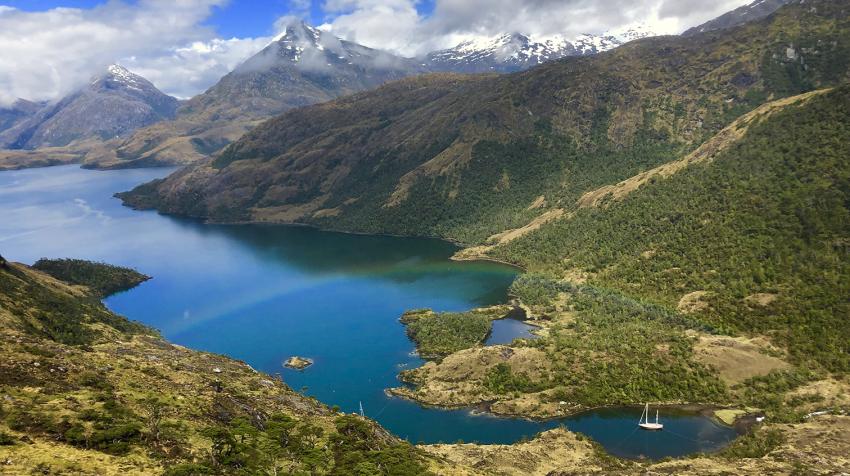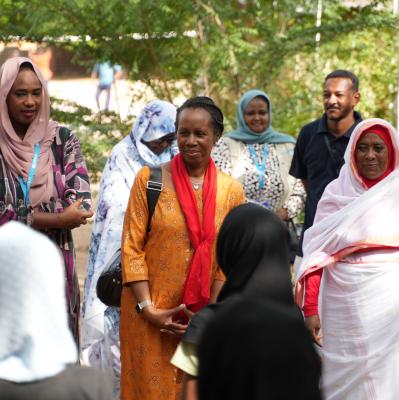Under-Secretary-General Amandeep Gill, the Secretary-General's Envoy on Technology, discusses the state of artificial intelligence (AI), its potential use by the United Nations to address global problems, and the need for international AI governance.

Rethinking Universal Basic Income: Economic Productivity, Quality of Life and the Sustainable Development Goals
Mariano Torras
Even if humanity possesses sufficient specialized knowledge to liberate itself, a gravely and persistently unequal social structure continues to hamper all the world’s countries.

Sunsets, Anger and Activism: On Youth Leadership in Urbania
There is good news: the youth climate justice movement has officially declared that we do not intend to wait until someone invites us to make decisions affecting our own present and future.

A Window of Opportunity in Haiti
Haiti has been beset by numerous challenges over the years, most recently incessant violence and insecurity, but also political instability, underinvestment in basic services and a succession of natural disasters.
Most Popular

The Global Challenges of Defining Genocide: Responses to Renewed Debates
Currently, the global community is experiencing an increase in the propensity of extraordinary crimes. Conflicts are changing and becoming more complex. Protracted crises remain unresolved. The spread of misinformation on social media is causing hate speech and polarization to spike, making it harder for communities to come together to address crises that are unfolding in real time.

A Chronicle Conversation with Paloma Merodio Gómez
Leading up to the Seventh High-level Forum on United Nations Global Geospatial Information Management (UN-GGIM) in October, the UN Chronicle asked Paloma Merodio Gómez, former UN-GGIM Co-Chair and Vice President of the Instituto Nacional de Estadística y Geografía of Mexico, about geospatial information as fundamental to sustainable development.

Improving Diagnosis for Patient Safety: A Global Imperative for Health Systems
States are increasingly recognizing the importance of ensuring access to safe diagnostic tools and services, towards avoiding preventable harm and achieving positive patient outcomes.
Also featured

How International Cooperation in Policing Promotes Peace and Security
The role of international policing is closely aligned with the principles of justice, peace, democracy and human rights, and is integral to the 2030 Agenda for Sustainable Development.

Voices for Peace: The Crucial Role of Victims of Terrorism as Peace Advocates and Educators
In the face of unimaginable pain and trauma, victims and survivors of terrorism emerge as strong advocates for community resilience, solidarity and peaceful coexistence.

Sailors for Sustainability: Sailing the Globe to Document Proven Solutions for Sustainable Living
Most of the solutions we have described are tangible examples of sustainability in action. Yet our sailing journey also made us realize that the most important ingredient for a sustainable future is sustainability from within. By that we mean adopting a different way of perceiving the Earth and our role in it.

What if We Could Put an End to Loss of Precious Lives on the Roads?
Road safety is neither confined to public health nor is it restricted to urban planning. It is a core 2030 Agenda matter. Reaching the objective of preventing at least 50 per cent of road traffic deaths and injuries by 2030 would be a significant contribution to every SDG and SDG transition.
Chronicle Conversations
Chronicle Conversation with United Nations Under-Secretary-General Amandeep Gill, 20 July 2023
Youth Issues
The UN Chronicle interviews youth environmental activist Aditya Mukarji
Lyubov Ginzburg of the UN Chronicle interviews fifteen-year-old environmental activist Aditya Mukarji on the problem of plastic pollution and the first-ever United Nations Youth Climate Action Summit. 22 September 2019, New York
Legacy Showcase

Sport Aims for the Goals
It is well known that physical activity improves personal health and well-being, but the benefits of sport to society are less apparent. This issue of the Chronicle explores the ways in which sport can enable individuals and communities to build a stronger, more harmonious world.

The Youth Issue: Young People Speaking their Mind
What do 1.2 billion young people think about a world whose leadership they are about to inherit? To find out, the UN Chronicle invited young persons between twelve and twenty-four years old from around the globe to take over its pages for this special Youth Issue. Read their opinions, concerns and suggestions on nuclear disarmament, on protecting child soldiers, on social media and the digital divide, adolescent marriage and sexuality, rights of indigenous communities, and more. The Youth Issue also features exclusive essays written by the UN Chronicle's Facebook audience on the Millennium Development Goals.
Latest Reports

UNEP Emissions Gap Report 2024
Emissions Gap Report 2024: No more hot air … please!
The report looks at how much nations must promise to cut off greenhouse gases, and deliver, in the next round of Nationally Determined Contributions (NDCs), due for submission in early 2025 ahead of COP30. Cuts of 42 per cent are needed by 2030 and 57 per cent by 2035 to get on track for 1.5°C.
About the UN Chronicle
The UN Chronicle, produced by the United Nations Department of Global Communications, has served as the Organization’s flagship magazine since 1946, providing authoritative information and debate on the activities of the larger United Nations system. Learn more...






